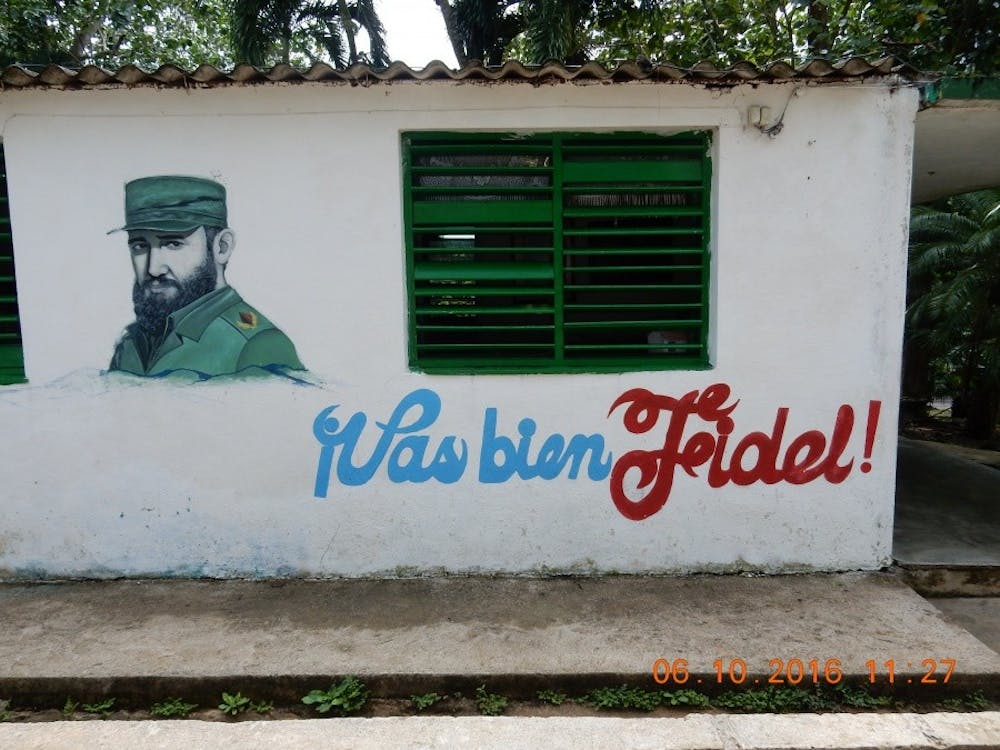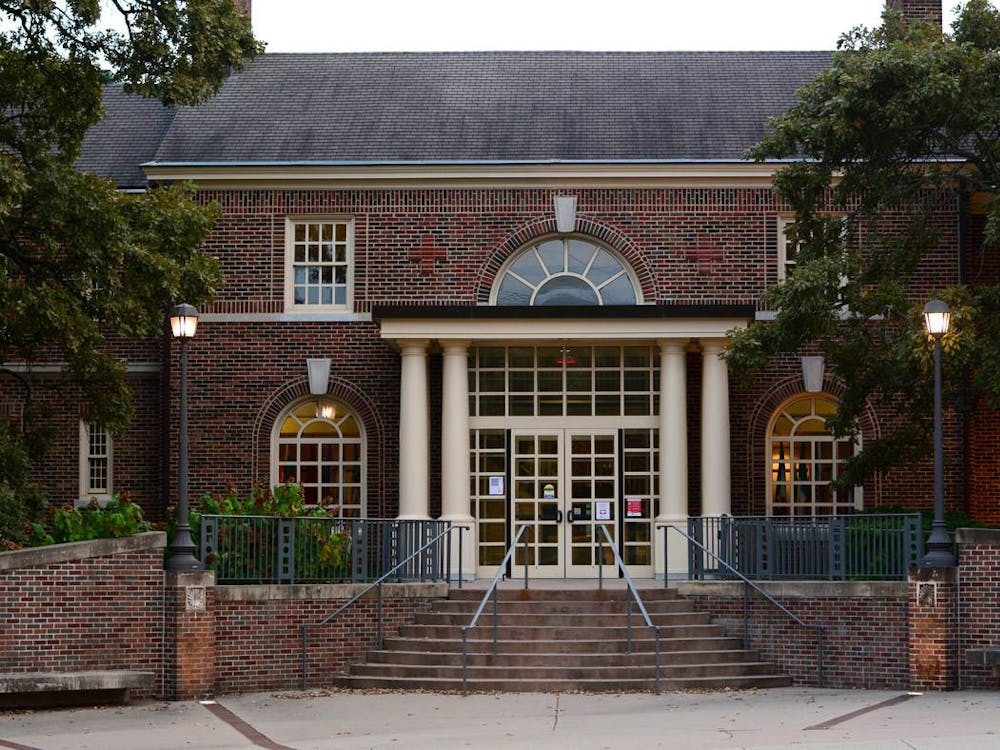By Emily Williams, Managing Editor
On Sunday, Dec. 4, the remains of Fidel Castro were placed into a crevice in a large, boulder-like crypt. The structure was unadorned except for a single sign -- a metal plate that reads,
"FIDEL."
The final resting place of Castro, who stood at the helm of the first communist state in the Western hemisphere for almost 50 years, is in Santiago de Cuba, the same city where the Cuban Revolution began in 1959. His crypt sits in the shadow of an 85-foot mausoleum dedicated to the "Prophet of the Cuban Revolution," poet, journalist and revolutionary Jose Marti.
The death of the 90-year-old former leader has prompted a wave of mixed reactions, from celebratory parades in Miami, Florida to a somber tribute in Havana's Revolution Square.
Gerardo Brown-Manrique, an architecture professor and coordinator for the Urban Design minor at Miami University, lived in Cuba for part of his childhood. Brown-Manrique's father worked for the Cuban government as part of Castro's treasury department.
He disagreed with Castro's nationalization of housing and, eventually, was sent as a diplomat to Indonesia -- far from Havana -- too far to contradict Castro and his ideas. Exiled, Brown-Manrique's father moved to the United States to be with his family.
"He was better off sent away than to prison," Brown-Manrique said.
His father passed away this year, in January, at the age of 99.
"We've talked about this irony of both of them dying in the same calendar year."
Juan Carlos Albarran, a lecturer for Miami's Global and Intercultural Studies Department, collected an oral history from Brown-Manrique's father about his years in Cuba. Albarran was born and raised in the Chinatown area of Havana, right in the core of the city, a working-class neighborhood.
Albarran noted a generational divide in how Cubans perceive Castro and the Cuban government.
Enjoy what you're reading?
Signup for our newsletter
Albarran's grandfather died believing in the revolution, even though, at the time, he was living off of remittances sent from his family living in the United States.
"My dad, educated on the Revolution, believed in it, but died very disappointed," Albarran said. "My generation, while we understand education and health care, also wanted to be individuals."
He moved to the United States to join his family when he was in his twenties, during the Special Period -- a time of economic crisis in Cuba following the dissolve of the Soviet Union.
"I wanted to build a future for my own," Albarran said.
He wanted to go back to school and open his own business, but after moving to Tucson, Ariz., he started volunteering in Latin American communities and went on to earn a graduate degree in Latin American studies.
Albarran found that after he was physically separated from his country, he became more engaged in its music, literature and history than he ever had before. When he was in Cuba, Albarran said, he wanted to read and learn about everything outside of Cuba, but, since leaving, he's always felt himself trapped between two worlds.
"I always put all things in the context of me being a Cuban," Albarran said.
Albarran has played an integral role, along with professor Melanie Ziegler, in developing Miami's "Cuba in Transition" study abroad trip. The inaugural trip was held in January 2014.
Albarran has since led multiple trips and said he has seen a noticeable change in the students' attitudes, especially after President Obama and Raul Castro, who took his older brother's position as president in 2008, announced that the United States intended to start normalizing relations with the island nation in December 2014.
"Students were very apprehensive in the beginning," Albarran said. "But, increasingly, as they saw other universities go there, they have felt more comfortable. There isn't that element of fear anymore."
The Cuba Albarran sees with his students is very different, though, from the Cuba he sees on personal trips to visit relatives.
"As a tourist it removes you from the daily aspects of the Cuban people," he said. "For me now with students, I go as a tourist. I see a Cuba that is very sanitized."
Ziegler, a senior lecturer in Miami's Global and Intercultural Studies department, has traveled to Cuba 10 times. Her first trip was in 1995, during Bill Clinton's presidency when citizens were permitted travel to Cuba for "people-to-people" excursions for educational or religious purposes.
At that time, it was assumed by many that Cuba was about to collapse, and Ziegler had to have a chance to see it.
Ziegler's fixation on Cuba started when her family bought their first television set. On that television set, she saw two very different Cuban men -- actor Ricky Ricardo, her first crush, the "Babalu"-singing, joke-cracking star of the sitcom "I Love Lucy," and Fidel Castro, a stern, bearded figure, angrily pointing his finger at America through its television sets.
The contrast fascinated her.
"Cuba was always on my mind," Ziegler said. "It's always been about Cuba."
Ziegler said throughout the years, she has seen an ebb and flow of hope, fear, uncertainty and progress on the island. There was fear when Castro's health was declining, hope when the United States elected Barack Obama, progress in the improvements made to the tourism infrastructure after Americans started to make the 45-minute flight from Miami to Havana again.
Since 1962, the United States has maintained a comprehensive embargo on Cuba. Recently, the push to normalize relations with Cuba has increased hope that there could be an eventual end to the embargo.
In the course of a month, though, the Cuban people saw the death of the leader of the Cuban Revolution and the election of Donald Trump. President-elect Trump stated in a tweet that, if Cuba did not make a "better deal," he would "terminate" the current arrangement.
Cuban American Mauricio Claver Carone, a harsh critic of President Obama's efforts to normalize relations with Cuba and a staunch supporter of the United States' embargo on Cuba has also joined Trump's administration. That, Ziegler said, is an unquestionable recipe for uncertainty for the Cuban people.
One thing that surprised Ziegler, she said, was the news coverage she saw after Castro's death on November 25.
"I was surprised how quickly the television coverage seemed like 1962 again," Ziegler said. "Fidel Castro was shown as a caricature -- a brutal dictator, a thug. 'How many decades has this been?' I thought."
Most Americans lack an understanding of Cuban history, Ziegler said, and the United States' role in that narrative -- a history that is necessary to understand the contradictions wrapped up in Castro's Cuba.
"There's an element of nostalgia there, a preconceived notion of old cars and cigars. It's more complex than that, a challenge to understand, like any other society," Albarran said.
Brown-Manrique had a friend while he was growing up in Cuba who wouldn't say Castro's name. Instead, she would call him "the bearded one."
"Yes Fidel was a terrible person, a dictator, an autocrat. He oppressed [Cubans] and kept them from leaving," Brown-Manrique said. "But he gave them free education, free healthcare."
How Castro will ultimately be remembered, by Cubans and by the rest of the world, will depend on perspective, Brown-Manrique said.
"It will depend on who writes the history."




